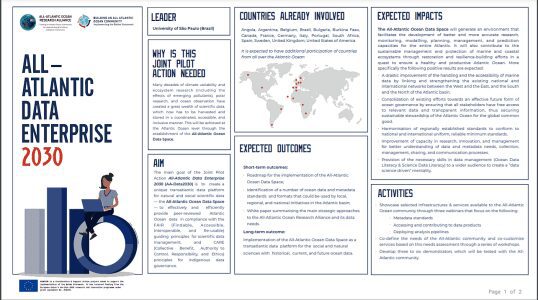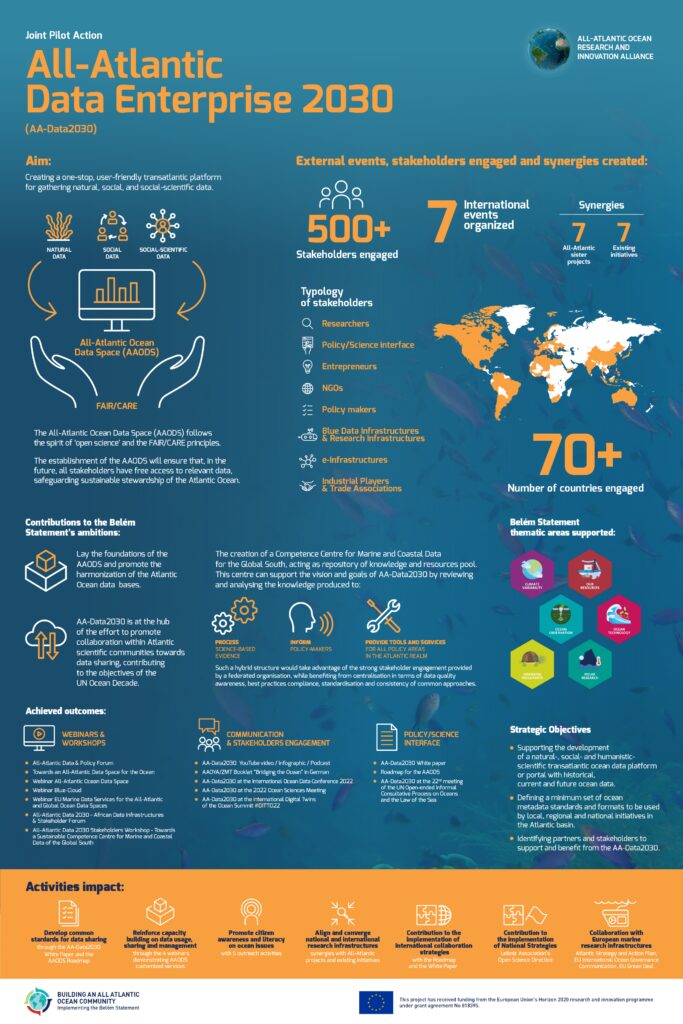All-Atlantic Data Enterprise 2030
The All-Atlantic Data Enterprise 2030 (AA-DATA2030) Joint Pilot Action aims at creating a one-stop, user-friendly transatlantic platform for gathering natural, social, and social-scientific data: the All-Atlantic Ocean Data Space (AAODS). The All-Atlantic Data Enterprise 2030 will support transatlantic information and data sharing in the spirit of ‘open science’ and the FAIR/CARE principles. The establishment of the All-Atlantic Ocean Data Space will ensure that, in the future, all stakeholders have free access to relevant data, thus safeguarding sustainable stewardship of the Atlantic Ocean.
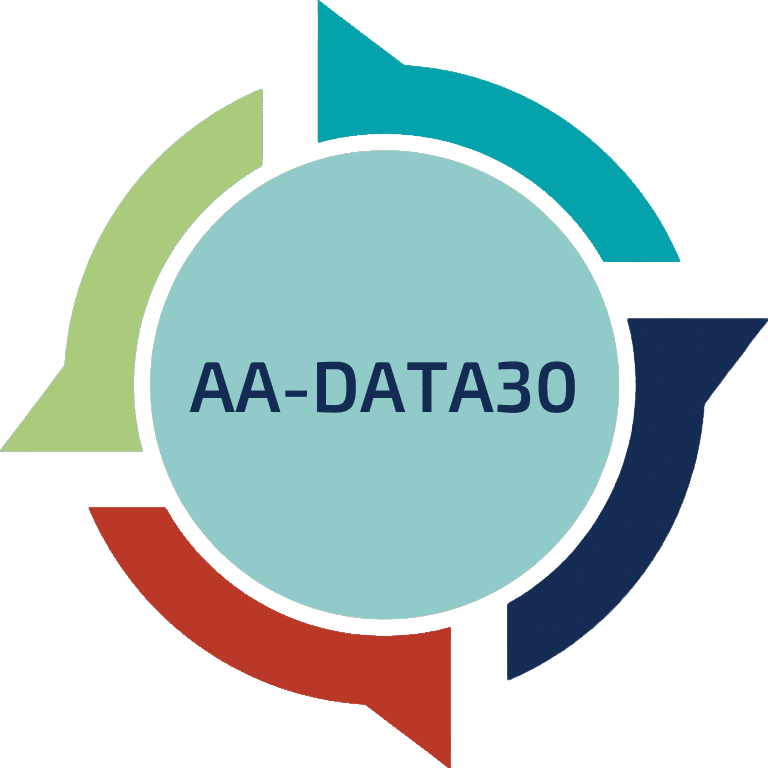
Aim
The main goal of the Joint Pilot Action All-Atlantic Data Enterprise 2030 (AA-Data2030) is to create the All-Atlantic Ocean Data Space — to effectively and efficiently provide peer-reviewed Atlantic Ocean data in compliance with the FAIR (Findable, Accessible, Interoperable, and Re-usable) guiding principles for scientific data management, and CARE (Collective Benefit, Authority to Control, Responsibility, and Ethics) principles for indigenous data governance.
Many decades of climate variability and ecosystem research (including the effects of emerging pollutants), polar research, and ocean observation have created a great wealth of scientific data, which now has to be harvested and stored in a coordinated, accessible, and inclusive manner. This will be achieved at the Atlantic Ocean level through the establishment of the All-Atlantic Ocean Data Space.
In the long term, the Joint Pilot Action AA-Data2030 will produce a set of recommendations and products to drastically improve the handling and the accessibility of marine data by strengthening the existing networks between the West and the East, and the South and the North of the Atlantic basin. As such, AA-Data2030 promotes a comprehensive assessment of the status of ocean-related data in the Atlantic and provides forward-looking strategic recommendations and structures for more efficient data to knowledge transfer.
Activities and Outcomes
Several activities planned for the short term will help achieve the goals that have been set for this Joint Pilot Action:
Showcase selected infrastructures & services available to the All-Atlantic Ocean community through three webinars that focus on the following: Metadata standard, accessing and contributing to data product, deploying analysis pipelines
Co-define the needs of the All-Atlantic community and co-customise services based on this needs assessment through a series of workshops
Develop three to six demonstrators which will be tested with the All-Atlantic community
Impacts
The Joint Pilot Action AA-Data2030 will, through a fundamental mind-set shift, contribute to the ambitions of the All-Atlantic Ocean Research Alliance by collecting data without precedent, defining common standards for data sharing, integrating intercontinental science policy and networks, and ultimately generating a fully operational online data platform for the Atlantic Ocean.
More precisely, AA-Data2030 will contribute to the goals of the Alliance by:
Promoting a new collaborative attitude that derives from the understanding that it is in the interests of individuals to contribute to the protection of a common good: the Atlantic Ocean;
Standardising the way Atlantic Ocean data are collected, stored and shared through joint prioritisation of cooperation activities and the use of existing structures;
Promoting economic benefits through easy access to high-quality data, information, content, and knowledge;
Improving social welfare as society will benefit from the information that is more transparent and accessible.
AA-Data2030, will undoubtedly also benefit the following key common areas of interest under the All-Atlantic Ocean Research Alliance: Climate Variability, Ocean Observation, Ocean Resources, Ocean Technology, Emerging Pollutant, Polar Research.

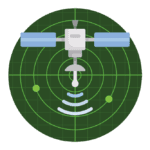
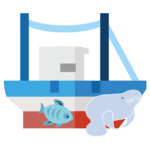


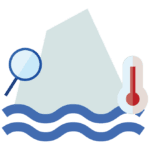
Outcomes
Short-term achieved outcomes (from January 2021 to January 2023):
Got the community together to showcase selected infrastructures and services available: Joint AtlantOC-AA-DATA2030 Ocean Hour: All-Atlantic Ocean Data space (AAODS) (October 2021); Blue-Cloud: An open science platform for collaborative marine research across the Altantic and beyond (December 2021); EU Marine data services for the All-Atlantic and global Ocean data spaces (May 2022); Showcasing data infrastructures and operators in Africa (May 2022). See report here.
Got the community together to define the needs and costumize services for the All-Atlantic Ocean community: (1) All-Atlantic Data & Policy Forum (May 2021); (2) All-Atlantic Data 2030 – African Data Infrastructures & Stakeholder Forum (May 2022); (3) All-Atlantic Data Enterprise 2030 Stakeholders Workshop – Towards a Sustainable competence Centre for Marine and Coastal Data of the global South (November-December 2022). See reports here: (1); (2); (3).
Defined a roadmap for the All-Atlantic Data Space drawing from the above mentioned events. See roadmap here.
Presented 4 demonstrators in scope of AAODS customized services: Blue-Cloud: An Open Science platform for collaborative marine research across the Atlantic and beyond (December 2021). See report here.
Defined a white paper towards the development of AAODS. See white paper here.
- Established synergies with 6 All-Atlantic sister projects, 3 international projects and 5 initiatives (organizations, universities and research centers among others).
Long-term expected outcomes:
Implementation of the All-Atlantic Ocean Data Space as a natural-, social- scientific transatlantic ocean data platform with historical, current, and future ocean data.
The All-Atlantic Ocean Data Space will generate an environment that facilitates the development of better and more accurate research, monitoring, modelling, planning, management, and prediction capacities for the entire Atlantic. It will also contribute to the sustainable management and protection of marine and coastal ecosystems through restoration and resilience-building efforts in a quest to ensure a healthy and productive Atlantic Ocean. More specifically the following positive results are expected:
A drastic improvement of the handling and the accessibility of marine data by linking and strengthening the existing national and international networks between the West and the East, and the South and the North of the Atlantic basin;
Consolidation of existing efforts towards an effective future form of ocean governance by ensuring that all stakeholders have free access to relevant data – transparent information – thus securing sustainable stewardship of the Atlantic Ocean for the global common good;
Harmonisation of regionally established standards to conform to national and international uniform, reliable minimum standards;
Improvement of capacity in research, innovation, and management for better understanding of data and metadata needs, collection, management, sharing, and communication processes;
Provision of the necessary skills in data management (Ocean Data Literacy & Science Data Literacy) to a wider audience to create a “data science-driven” mentality.
Partners Involved
Led by the University of São Paulo, Brazil, AA-Data2030 includes the participation and involvement of several countries: Angola, Argentina, Belgium, Brazil, Bulgaria, Burkina Faso, Canada, France, Germany, Italy, Portugal, South Africa, Spain, Sweden, United Kingdom, United States of America. It is expected to have additional participation of countries from all over the Atlantic Ocean.
Who else can be involved?
Academia (universities and research centres); Industry (e.g. small and medium-sized enterprises); Public/private sector industry (fisheries, aquaculture, tourism, agriculture, aquatic sports); Human health associations; Global Ocean Observing System (GOOS) entities, regional associations (e.g. GOOS Regional Associations and GOOS bodies); Provincial and local governments; Government/policymakers – e.g. ministries, agencies, and elected officials; Other organizations – e.g. NGOs and civil society.
